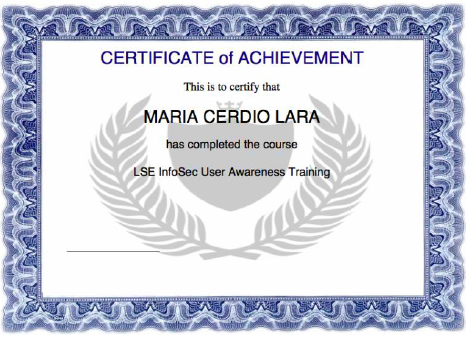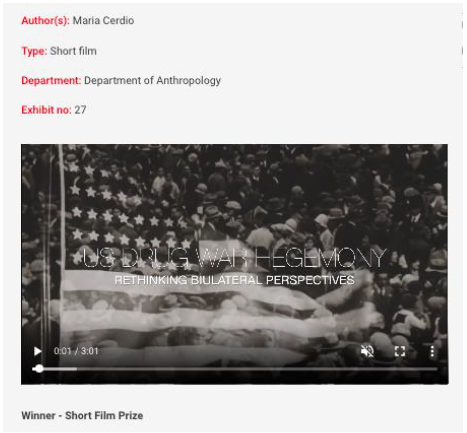The US has traditionally been viewed as a key actor in international drug control. Indeed, many accounts highlight the US as the key protagonist, or hegemon, responsible for the creation of the UN drug control system, as codified under the various UN drug control treaties. The relationship between US bilateral diplomacy and its negotiated process around exporting the US model of drug control to specific key states has received less attention. My research with Dr. Collins aims to develop a more vivid and clear picture of the US’s role in the drug policies of states around the world and thereby discern some of the mechanisms and leverage points the US was able to exert in its export of the ‘war on drugs’ model. In particular, it focuses on the development of drug and security policy in Mexico over the past two decades and the role the US may have played in this process.
As one of the countries that has been hardest hit by the ‘war on drugs’, Mexico is an important case to analyse. Mexico is the US’s largest supplier of heroin, marijuana, and methamphetamine and the leading transit country for cocaine coming from South America. At the same time, firearms and cash flowing into Mexico fuel violence and organised crime. Not surprisingly, there is a long and complex history of cooperation on this issue between both states. Much of the literature holds that drug policy in Mexico is driven by US pressure to comply with and follow its security agenda. While it is clear that the United States has been closely involved in shaping Mexico’s counternarcotics strategy, the details of this relationship remain underexamined. As a central contribution, our research seeks to reach a more nuanced understanding of policy formulation in Mexico, based on an analysis of the web of actors involved and the history of US-Mexico bilateral relations in the context of the ‘war on drugs’.
Methodology
My primary responsibilities as a Research Assistant have been collecting primary data and conducting a literature review. I completed an overview of relevant sources such as policy documents, news reports, and studies produced by the Government of Mexico, the US Congressional Research Service, academia, think tanks, and other civil society organisations. The literature review was used to identify the key developments in Mexican drug policy since 1988, and to contextualize our research against broader socio-economic and historical circumstances. In particular, I focused on the shifting relationship between the US and Mexico. This task allowed me to familiarize myself with the history of international and national drug control, and to gain a deeper understanding of my country.
To complement the information obtained in the literature review, I conducted semi-structured interviews with experts on drug and security policy in Mexico. Participants included academics, civil society organisations, as well as a top official from the Mexican Ministry of Foreign Affairs. These interviews emphasized the key internal and external factors shaping Mexico’s counternarcotics strategy since 2006, and the main actors involved. Leading the interview process granted me the opportunity to learn about research ethics procedures to safeguard participant data. After completing the LSE Information Security Awareness Training (Figure 1), I produced and implemented a Data Management Plan and a Research Ethics Review. This experience was invaluable to me as an anthropology student, as the nature of research in the discipline involves managing highly sensitive personal data. Additionally, I gained insight into the complexities of researching contentious issues such as the ‘war on drugs’.
Figure 1

One of the most rewarding aspects of the research assistantship was the opportunity to participate in the LSE Festival Research Competition. I used the research I had done so far to write and produce a short film, which was awarded the Jury Prize (Figure 2). Making this video challenged me to communicate complex ideas more creatively and effectively, and allowed me to share my work with a wider audience. It was very exciting to have my film displayed in the New Academic Building and featured online. Moreover, participating in the competition made me feel part of the LSE community while introducing me to the fascinating research being done throughout the university.
Figure 2

Results and some Conclusions
So far, the data I have collected through the interviews and literature review supports our central hypothesis. The sources demonstrate that drug and security policy in Mexico has responded to local interests to the same extent, at least, than to US pressures. Indeed, counter to the orthodoxy of US hegemony, our research points to the multiplicity of actors involved in shaping the ‘war on drugs’ as it has unfolded in Mexico. My conversations with experts have shed light on the relevance of individual officials and state agencies, particularly the Ministry of Foreign Affairs, as well as the role of civil society. The literature review has allowed us to contextualise these findings to examine how how the ‘war on drugs’ rhetoric was subsumed to broader policy objectives that intersected with US-Mexico bilateral relations. Although the United States constrained the scope for action by setting drug policy at the core of negotiations, a prohibitionist and enforcement-led model would not have been possible without its assimilation by local actors for their own purposes. What emerges is a much more contested policy process than suggested by the emphasis on US influence, in line with anthropological and sociological actor-oriented approaches.
The material collected throughout the Research Assistantship has opened up exciting avenues to deepen our research. Dr. Collins and I believe there is great potential for producing a paper for publication in the Journal of Illicit Economies and Development. We seek to contribute to the literature on drug policy and US-Mexico bilateral relations by challenging dominant discourses. Additionally, publishing our work would be an invaluable opportunity for my professional development as I pursue a career in research. I am deeply grateful for this experience generously supported by the US Centre, and look forward to the possibility of continuing our collaboration.
Please note that this report gives the views and findings of the Undergraduate Research Assistant, and may not necessarily reflect those of their faculty supervisor, the US Centre or the London School of Economics.